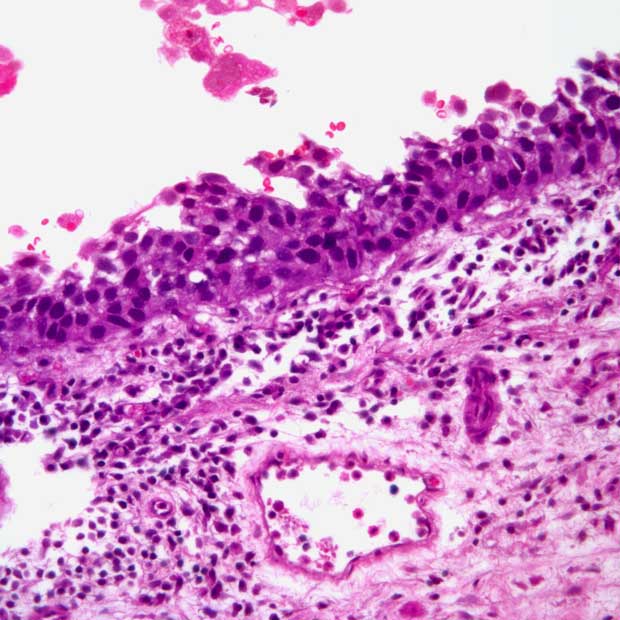EMA Accepts Review for Enfortumab Vedotin Combo in Urothelial Cancer
Supporting data for the EMA comes from the phase 3 EV-302 trial, which assessed the efficacy of enfortumab vedotin in combination with pembrolizumab compared with chemotherapy.
According to data presented at the 2023 European Society for Medical Oncology Congress (ESMO), enfortumab vedotin plus pembrolizumab met the dual primary end points of overall survival (OS) and progression-free survival (PFS) when compared with platinum- and gemcitabine-based chemotherapy.

The European Medicines Agency (EMA) has validated a review for a type II variation application for enfortumab vedotin-ejfv (Padcev) in combination with pembrolizumab (Keytruda) for the first-line treatment of patients with previously untreated locally advanced or metastatic urothelial cancer, according to a press release from Astellas Pharma.1
The application is based on results from the phase 3 EV-302/KEYNOTE-A39 trial (NCT04223856).
According to data presented at the 2023 European Society for Medical Oncology Congress (ESMO), enfortumab vedotin plus pembrolizumab met the dual primary end points of overall survival (OS) and progression-free survival (PFS) when compared with platinum- and gemcitabine-based chemotherapy. Patients in the experimental arm experienced a median OS of 31.5 months (95% CI, 25.4-not reached [NR]) compared with 16.1 months (95% CI, 13.9-18.3) in the chemotherapy arm.2 This improvement resulted in a reduction in the risk of death by 53% (HR, 0.47; 95% CI, 0.38-0.58; P <0.00001).
The media PFS in the experimental arm was 12.5 months (95% CI, 10.4-16.6) compared with 6.3 months (95% CI, 6.2-6.5) in the chemotherapy arm, resulting in a reduction in the risk of death or progression by 55% (HR, 0.45; 95% CI, 0.38-0.54; P <0.00001).
“Patients in Europe need better treatment options for advanced stage urothelial cancer, and we look forward to working with the EMA on their review of the combination of enfortumab vedotin and pembrolizumab,” Ahsan Arozullah, MD, MPH, senior vice president and head of oncology development at Astellas, said in the press release.1 “If approved, the combination would be the first alternative to a chemotherapy-based treatment for this patient population. This milestone is another opportunity to affirm our commitment to helping patients with advanced urothelial cancer live longer.”
This open-label, randomized, controlled study included 886 patients with previously untreated locally advanced or metastatic urothelial cancer who were eligible for cisplatin- or carboplatin-containing chemotherapy regardless of PD-L1 status. Patients were randomly assigned 1:1 to receive either chemotherapy or 1.25 mg/kg of intravenous enfortumab vedotin over 30 minutes on days 1 and 8 of a 21-day cycle combined with 200 mg of intravenous pembrolizumab every 3 weeks or 400 mg of pembrolizumab every 6 weeks until disease progression, unacceptable toxicity, or 2 years of therapy.
Secondary endpoints included overall response rate (ORR), duration of response (DOR), and safety. In the experimental arm, the ORR was 68% (95% CI, 63.1%-72.1%; P <0.00001) compared with 44% (95% CI, 39.7%-49.2%) in the chemotherapy arm. In the experimental arm, the rates of partial responses and complete responses were 38.7% and 29.1%, respectively. In the chemotherapy arm, the respective rates were 32.0% and 12.5%.
The median DOR was not reached in the experimental arm and 7 months (95% CI, 6.2-10.2; P <0.00001) in the chemotherapy arm.
The most common grade 3 or higher treatment-related adverse effects (AEs) were maculo-papular rash, hyperglycemia, neutropenia, peripheral sensory neuropathy, diarrhea, and anemia.
Enfortumab vedotin plus pembrolizumab was approved in the United Stated by the FDA for those with locally advanced or metastatic urothelial carcinoma on December 15, 2023.3
References
- European medicines agency validates type II variation application for PADCEVTM (enfortumab vedotin) with KEYTRUDA®(pembrolizumab) for first-line treatment of advanced bladder cancer. News release. Astellas Pharma Inc. January 26, 2024. Accessed January 26, 2024. http://tinyurl.com/29s9h8dk
- Groundbreaking EV-302 Trial Significantly Extends Overall Survival and Progression-Free Survival in Patients Treated with PADCEV® (enfortumab vedotin-ejfv) and KEYTRUDA® (pembrolizumab) in First-Line Advanced Bladder Cancer.Astellas. October 23, 2023. Accessed January 26, 2024. http://tinyurl.com/yzf4urua
- FDA approves enfortumab vedotin-ejfv with pembrolizumab for locally advanced or metastatic urothelial cancer. News release. FDA. December 15, 2023. Accessed January 26, 2024. https://bit.ly/48ls9bi